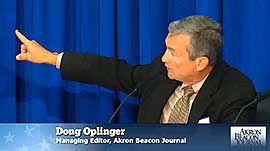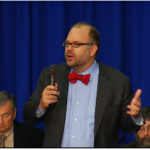Blog:
Conversations for impact: New ethical considerations for political coverage

Akron Beacon Journal managing editor Doug Oplinger says journalists let “too many politicians… shove their own agendas down the pipe.” Credit: Kent State University

Getting somewhere new. That’s what the four online JA conversations building on the 2012 Poynter/Kent State media ethics workshop are designed to do. Tap into the wisdom of people experienced in ethics, political coverage or both; hear the questions of those fresh to the field; create, informed by these conversations, a crowdsourced best practices guide to political coverage exploring approaches and challenges across the field.
Kent State University journalism professor Jan Leach will lead the creation of that guide in early 2013. Meanwhile, the conversation threads stay open for your input. Outlined below are a number of places where we welcome you to participate! This post highlights key points from discussions on fact-checking and changing the approach to reporting. An earlier distillation covers conversations on managing “access journalism” and the challenges of social media in political coverage.
Delivering coverage citizens deserve
The primary question of this forum was whether different political coverage might better help voters. It rose to the top four of many more ethical issues that emerged at the 2012 Poynter/Kent State media ethics workshop in part because of a passionate presentation Akron Beacon Journal managing editor Doug Oplinger gave there. He elaborated in the JA online forum.
We need to deliver stories about people up the pipeline to public officials, and let officials react. That requires reversing the flow in many cases, because right now we’re allowing too many politicians to shove their own agendas down the pipe. And if you think about it, that changes the entire relationship with the public. If we’re just delivering the news from government and organizations, citizens can take it or leave it. And if that news doesn’t pertain to their daily lives, they leave it.But if we’re listening to citizens, and delivering their stories up the pipeline for officials to react, we become valuable, and they also watch the officials to see if they care.”
This sparked deeper discussion on who journalists serve. J-school grad student Elizabeth Nalewajk asked whether reversing the pipeline might end up with journalists serving politicians.
If we reverse the pipeline, aren’t we essentially doing the job now of the people we have elected to know about their constituents and their needs?”
Also discussed:
- Tailoring coverage for relevancy.
- Reporting on candidates’ style in debates.
- Not-so-obvious coverage practices to hold officials accountable.
Ethics expert Bob Steele says go behind the scenes.
“…one way to help the public hold the public officials accountable is to provide more substantive reporting on the “process” that is part of politics and government. Both journalists and citizens should scrutinize the “way” government officials and politicians go about their work…We need to learn everything we can about what’s behind the actions and the words of the powerful to hold them accountable.”
Randy Reame (@CANT_CON_ME) suggested withholding coverage from politicians who don’t answer questions.
@journaccel start by announcing that all politicians who wont answer just give talkin points and deflect will not get coverage no free B.S.
— Randy Reaume (@CANT_CON_ME) October 4, 2012
That reminded me of something USA Today reporter Gregory Korte said about managing the ethical perils of journalism that relies on access to people in power.
“Every time I push back hard — not just about quote approval, but also backgrounders, e-mailed statements, etc. — I’m told, “Well, I deal with reporters all the time, and no one else has a problem with it.”
Can media, collectively, change the game?
Fact-checking
One challenge to delivering information voters deserve is the rise of social media and its companion, targeted online advertising. Now political campaigns have more ways than ever to reach voters directly. In the kickoff conversation to the fact-checking thread, Rob Farley of FactCheck.org pointed to recent research indicating that’s not helping spread accurate information.
The rise of fact-checking
Fact-checking has become so much a part of political coverage that “fact-checking the fact-checkers” has become part of the partisan game. The fact-checking movement gained attention and has enjoyed increasing distribution over the past five years, but this New America Foundation report credits its birth to President Ronald Reagan – and a claim he made about trees.
An analysis by the Annenberg Public Policy Center found that from December 1, 2011 through June 1, 2012, 85% of the dollars spent on presidential ads by four top-spending third-party groups were spent on ads containing at least one claim ruled deceptive by fact-checkers.”
Both practical tips to guide your fact-checking decisions and larger questions of how to keep politicians honest emerged early in this conversation.
Former Seattle Times executive editor Mike Fancher explained why he thinks fact-checking is increasingly required in political coverage.
The conversation so far also:
- Explored that vague phrase that sometimes prefaces questions: “Some people are saying”.
- Surfaced a new resource, EconoCheck, for people who want to verify candidates’ economic claims.
- Offered tips on what, from all the campaign rhetoric, it’s useful to check out, including specific guidelines for analyzing and reporting on ads.
- Explored considerations to apply to “he said, she said” articles, often criticized as uninformative.
Rob Farley reflected on whether fact-checking might change the political dialogue, or reward news organizations.
Politicians have always misled. That’s not going to change. Campaigns have shown that they are going to continue doing and saying what works, regardless of whether fact-checkers say it’s wrong. Whether campaigns are “rewarded” for telling the truth lies in the hands of an informed electorate. As for the second question, to the extent that media must remain relevant to be financially solvent, I think it’s imperative to aggressively fact-check. Fact-checking is on the rise because readers crave the truth.”
How did you best expose truth, or see truth exposed, in coverage of the 2012 election? All these threads remain open to gather insight for the best practices guide. Add your lessons learned now! What would you like to see or do differently in 2014?










Weigh In: Remember to refresh often to see latest comments!
0 comments so far.